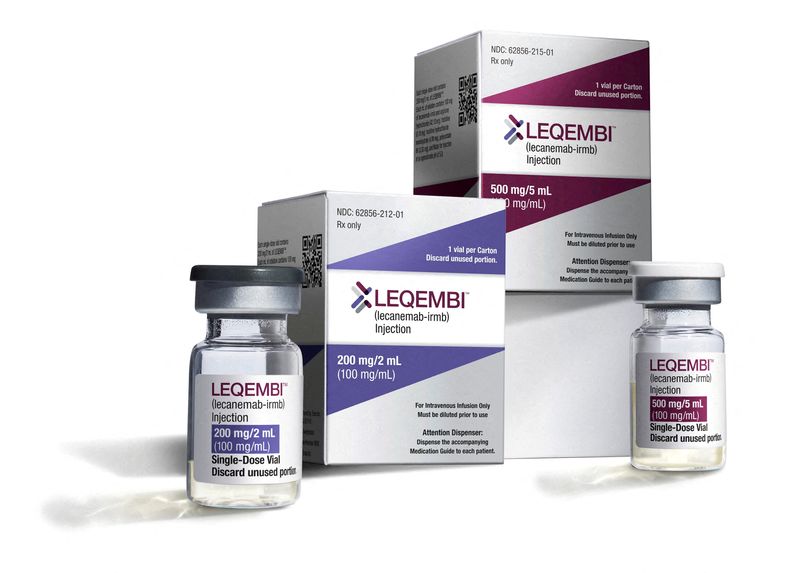By Julie Steenhuysen and Deena Beasley
CHICAGO (Reuters) – Five major U.S. health systems said they would offer Eisai and Biogen’s promising new Alzheimer’s drug Leqembi after working out payment and administrative policies, and how to assess and monitor patients, most likely in the next month or two.
Leqembi, which won full U.S. regulatory approval last month, is the first treatment proven to slow progression of the mind-robbing disease for people in the earliest stages of Alzheimer’s.
The disease affects an estimated 6.5 million people, most of whom are part of the U.S. government’s Medicare plan for people 65 and older.
“The patients are lining up. They want to be treated, but it’s difficult to rush right into it,” said Dr. James Galvin, who heads the Alzheimer’s research program at the University of Miami Miller School of Medicine.
Neurologists at the Mayo Clinic in Rochester, Minnesota, Chicago’s Northwestern Memorial and Los Angeles’ Cedars-Sinai all said they plan to roll out the drug in the next few months. Cleveland Clinic and Utah’s Intermountain health system said they have not started offering it.
After the Food and Drug Administration (FDA) approval, the Medicare agency pledged to pay for the drug broadly and consider relaxing a decade-old restriction on a type of brain imaging recommended for candidates of the treatment.
Wall Street analysts are expecting payment and diagnostic testing issues to slow the launch of the drug by Eisai and partner Biogen and have publicly pressed the companies for sales information.
Tokyo-based Eisai said Aug. 1 during an investor call that a looser Medicare imaging policy could accelerate access to the drug. It expects 10,000 people to receive the drug by March 2024 and as many as 100,000 by 2026.
“Many physicians have been prescribing Leqembi and uptake continues to progress as anticipated,” Eisai and Biogen said in a joint email on Friday.
Galvin said he had just completed protocols for the treatment at UHealth-the University of Miami Health System, which must be reviewed and adopted by colleagues in departments including radiology, scheduling and billing.
Among the five neurologists in his division, 50 or more patients are waiting to be infused, Galvin said.
To qualify, patients undergo cognitive tests to ensure their disease is early enough to be treatable, genetic testing to better understand their risks for side effects, and either brain scans or a spinal fluid test to confirm the presence of amyloid – a protein that Leqembi removes. Amyloid testing appears to be a key stumbling block, Galvin said. Hospitals and patients prefer amyloid PET scans, a less-invasive testing approach that has been limited to patients in clinical trials. Medicare pays for the spinal fluid test.
Leqembi can cause brain swelling or bleeding, and patients must also undergo an MRI before treatment and several during treatment to watch for this risk, which the FDA has flagged. Anticoagulants can also raise the risk of bleeding in the brain.
Recognizing the brain swelling issue on an MRI is challenging, especially when it is mild, and takes special training, said Dr. David Knopman of the Mayo Clinic.
Before the July 6 full approval, Durham, North Carolina-based Duke University Health System started 16 patients on Leqembi who are paying for the drug out of pocket, said Director of the Duke Memory Disorders Program Dr. Kim Johnson.
Medicare said it plans to reimburse the drug, priced at $26,500 per year, in return for participation in a patient database. Johnson estimates the system has 100-150 diagnosed Medicare patients on a waitlist, but they will have to be reevaluated before treatment. Assessments for the presence of beta amyloid are all being done through spinal fluid tests, she said.
Dr. Sanjeev Vaishnavi, a neurologist affiliated with the Hospital of the University of Pennsylvania, said clinical rollout will start this month, with the first infusion expected in the next few days.
Neurologist Dr Sarah Kremen of Cedars-Sinai Medical Center in Los Angeles, said the hospital has yet to start dosing patients.
The hospital has been working with a wide range of departments, including the ER, to ensure physicians check whether patients are taking Leqembi and know how to treat them. “There is the potential for people to come in looking like they have had a stroke,” she said.
“We’re having meetings with 26 people present,” she said of the preparations.
(Reporting by Julie Steenhuysen in Chicago and Deena Beasley in Los Angeles; editing by Caroline Humer and Gerry Doyle)
